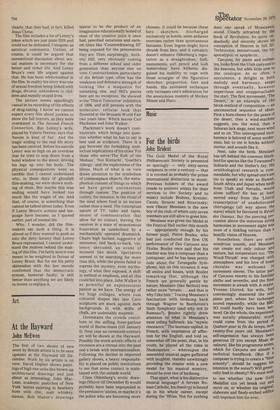Cinema
Sick joke
Kenneth Robinson
Lenny Director: Bob Fosse Stars: Dustin Hoffman, Valerie Perrine, Jan Miner 'X', Odeon, Haymarket (111 minutes)
This film begins by telling us, in a pious prologue, that the sick comic, Lenny Bruce, was persecuted for actions and language that have become part of normal life.
How dreadful, we are asked to think, that this likeable young man — played with enormous charm by Dustin Hoffman, — should have been rebuked for making jokes about venereal disease, sexual perversion and Jesus Christ. He was, after all, doing a great job. Or so the film almost makes us suppose, with its biased story-line and its arty black-and-white photography.
It took me some time to accept the lack of colour. I kept wanting to reach for the tuning controls. But I do see the value of putting a biography of Lenny Bruce in a stark form. There is something about heavy black and white that makes you think of all those dreadful civil-liberty publications. And this is mast certainly a whining plea for civil rights. Mr Bruce, said the opening commentator, is now resting on the conscience of America.
There is so much that is fascinatingly wrong-headed in this beau' tifully-made production that I hardly know where to grasp it to tear it apart. And it surely must be torn apart. I should hate to think many people would believe that Lenny Bruce's life was a dignified dedication to the end of suppression.
The suppression he talked about was the suppression of words. He believed, as the film shows, that venereal disease would be diminished if we allowed ourselves to say more about it. He considered that racial discrimination would be less violent if we could use words like 'nigger' so often that they became meaningless. And he felt that Jews would be treated with more tolerance if they admitted, loudly and clearly, that they had, in fact, killed Jesus Christ.
The film includes a lot of Lenny's jokes which are just plain filth and could not be defended, I imagine, as satirical comments. Unless, of course, it could be argued that unrestricted discussion about sexual matters is necessary for the better and richer life. And Lenny Bruce's own life argues against that. He has been whitewashed in the film. In reality his story was one of sexual freedom being linked with drugs, divorce, unkindness to children and messily-stupid lives.
The picture seems appallingly casual in its recording of the effects of drug-taking. I know we cannot expect every film about junkies to show the full horrors, as they were overstated in The Second French Connection. But Lenny's wife, played by Valerie Perrine, says that 'heroin is kind of fun'. And the tragic ending to the real life story has been omitted. Before his suicide Lenny was so high on an overdose that he tried to step down from a hotel window to the street, driving his legs up into his body. The physical consequences were so terrible that I cannot understand why, in these days of ghoulish film-making, we were shown nothing of them. But maybe this true ending would have looked too much like the wages of sin. And that, of course, is something that cannot be talked about today. Even if Lenny Bruce's actions and language have become, as I quoted , earlier, part of normal life.
Why, I wonder, did the filmmakers say such a thing. It is almost as if they wanted to push us into the dirty society that Lenny Bruce represented. I cannot understand the motives behind the making of this film. I'm fairly sure it was meant to be weighted in favour of Lenny Bruce. But for me his petty skirmishes with the law merely confirmed that the democratic system, however faulty, is still better than anything we are likely to invent to replace it.



































 Previous page
Previous page